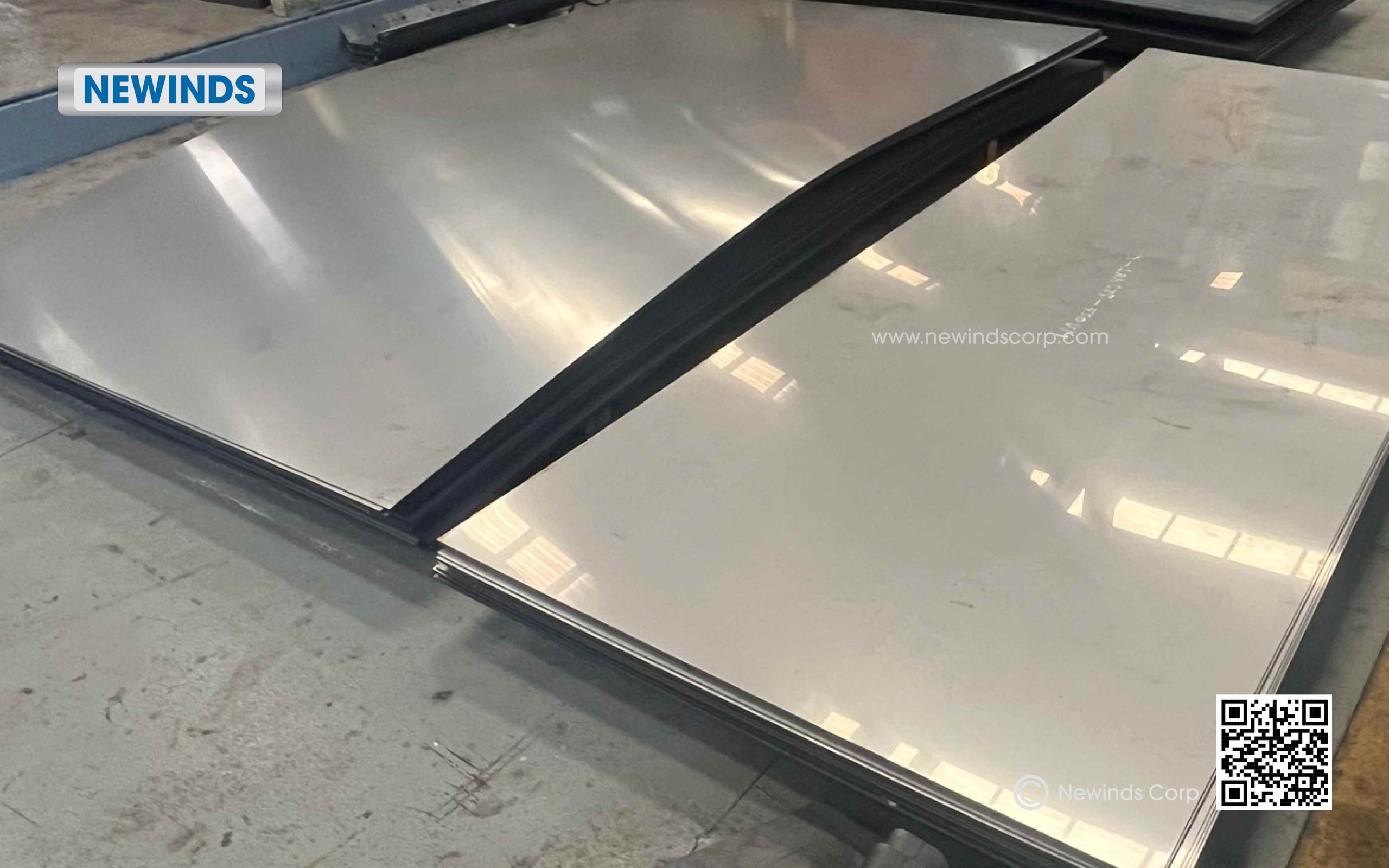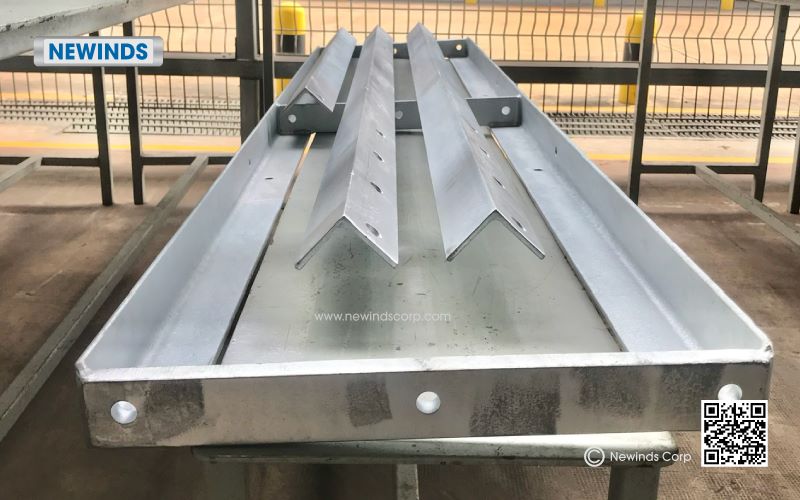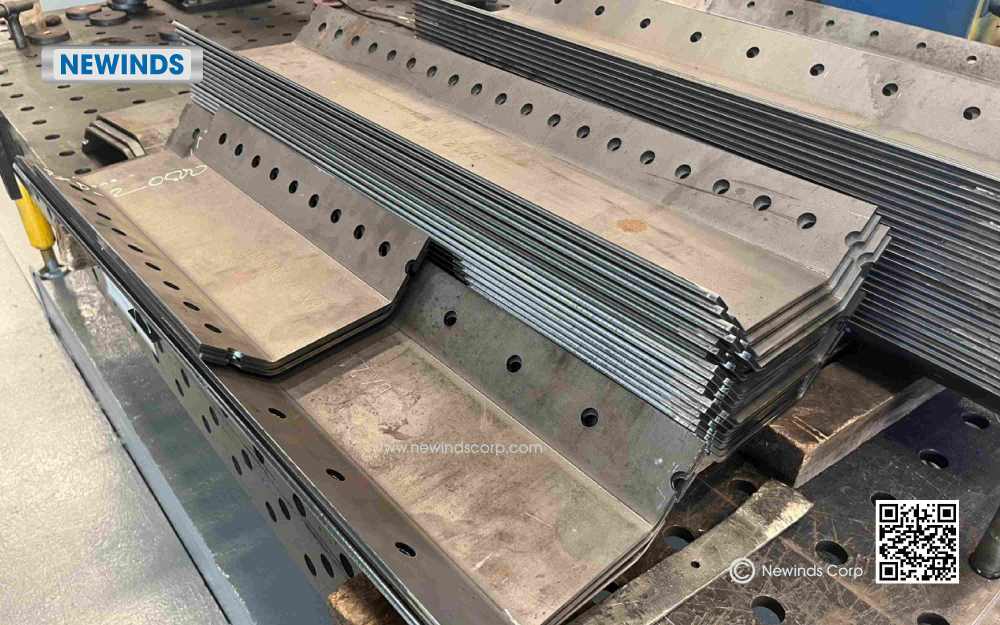Sheet Metal, Metal Sheet, and Plate Metal are often confused due to their similar properties. Though they are sometimes used interchangeably, each term refers to distinct thicknesses and specific applications. In this article, Newinds will help you distinguish the detailed characteristics and uses of each type.
1. SHEET METAL
Definition
Sheet metal refers to thin, flat pieces of metal manufactured through an industrial process. It is one of the basic forms used in metalworking and can be cut and bent into various shapes. The sheet metal stamping process results in highly precise metal components with flexible designs, making them suitable for use across various industries.
Thickness
Typically less than 6 mm (0.25 inches). The thickness of sheet metal is often determined by its specific gauge.
Common Materials
-
- Steel: Commonly used for its high strength and durability, with processes like cold-rolled, hot-rolled, and galvanized treatments.
- Aluminum: Known for its lightweight and corrosion resistance, ideal for the aerospace and automotive industries.
- Copper: Excellent electrical conductivity, used in specialized electrical products.
- Brass: Known for its aesthetic appeal and ease of fabrication, often used in decorative applications.
- Stainless steel: Corrosion-resistant, commonly used in kitchen appliances, medical devices, enclosures, and industrial applications.
Common Gauges
-
- Steel: 30 gauge (0.3 mm) to 8 gauge (4.1 mm).
- Aluminum: 36 gauge (0.12 mm) to 8 gauge (4.2 mm).
Manufacturing Processes
-
- Rolling: Passing the metal through one or more pairs of rolls to reduce its thickness.
- Stamping: Used to shape flat sheet metal into specific shapes based on different requirements.
Properties
-
- Ductile: Easily bendable or shapeable.
- Lightweight: Compared to thicker metal forms.
- Versatile: Can be used in a variety of applications.
Applications
-
- Automotive industry: Used for car bodies, fenders, body panels, doors, and hoods.
- Aerospace industry: Used for aircraft body, wings, tail structures, fuselage, and structural components.
- Construction: Building facades, roofs, partitions, ductwork, and structural components.
- Consumer products: Appliances like refrigerators, washing machines, computer cases, and dryers, as well as housings.
Advantages
-
- Workability: Easily cut, bent, and shaped into various forms.
- Cost-effective: Relatively inexpensive compared to thicker metals.
- Flexibility: Suitable for various industries and applications.
2. METAL SHEET
Definition
A metal sheet is a flat piece of metal with adjustable thickness, similar to sheet metal but generally thinner.
Thickness
Typically less than 6 mm, often measured similarly to sheet metal.
Common Materials
-
- Steel: Widely used for its strength and durability.
- Aluminum: Known for corrosion resistance and lightweight properties.
- Copper: Provides excellent electrical and thermal conductivity.
- Brass: Known for its aesthetic appeal, often used in interior decoration.
Applications
-
- Electrical: Copper sheets used for electrical conductors.
- Decorative: Brass sheets used for architectural details.
- Industrial: Machine parts, covers, lids.
- Used in similar applications as sheet metal, including automotive, aerospace, construction, and consumer products.
Note: The term “metal sheet” is broader and may refer to thinner metal pieces in contexts where “sheet metal” is implied.
METAL PLATE
Definition
Metal plate refers to thick, flat pieces of metal with considerable strength and durability. Typically thicker than sheet metal.
Thickness
Generally greater than 6 mm (0.25 inches), typically measured in inches or millimeters. Common thickness ranges from a few millimeters up to several inches.
Common Materials
-
- Steel: Structural steel for construction, load-bearing components, shipbuilding, equipment, and industrial machinery.
- Aluminum: Used for lightweight yet durable structural applications, suitable for aerospace and transportation industries.
- Copper: Less common for plates but used for high-conductivity applications requiring specific, unique properties.
- Brass: Less common, used for heavy-duty decorative components.
Manufacturing Processes
-
- Hot rolling: The metal plate is heated and passed through rollers to achieve the desired thickness.
- Cold rolling: The metal plate is rolled at or near room temperature to enhance its strength.
Applications
-
- Construction: Structural components like steel frame, beams, columns, and girders.
- Shipbuilding: Hulls, decks, and other structural components.
- Heavy machinery: Frames, supports, wear-resistant plates, and others.
- Infrastructure: Bridges, buildings, large structural components, heavy machinery parts.
Advantages
-
- Strong: Can withstand significant stress and impact.
- Durable: Highly sustainable and wear-resistant.
- Load-bearing: Suitable for high-load construction applications.
By understanding the differences in the properties, manufacturing processes, and applications of sheet metal, metal sheets, and metal plates, manufacturers, engineers, and designers can select the appropriate material for their projects. This ensures efficiency, cost-effectiveness, and durability.
SHEET METAL FABRICATOR IN VIETNAM
We provide custom sheet metal fabrication and value-added services, offering assistance from prototype to customized production cycles tailored to your needs.
We pride ourselves on being more than just a manufacturer; we are your dedicated partner in delivering comprehensive, custom-fabricated metal solutions. Our commitment to excellence is evident in every project we undertake, from the initial design phase to the final product delivery.
Our skilled team is dedicated to delivering customized metal solutions that comply with AS/NZS, USA, and EU standards, ensuring affordability and quality. We specialize in a variety of steel structures suitable for any industry. Our suite of services is comprehensive, including but not limited to:
- Laser Cutting
- Forming & Punching
- Stamping & Folding
- Bending & Machining
- Welding & Finishing
- Value-Added Services such as sourcing in castings, plastics, rubber, and more.
At Newinds, your project is our passion. We invite you to experience the difference that our full-service fabricated metal solutions can make.
If you are in search of a high-quality sheet metal fabricator in Vietnam, delivered with expert consultation and industry knowledge, we welcome the opportunity to discuss your needs.
Contact Newinds today to discuss your requirements
Email: sales@newindscorp.com
Phone/Whatsapp: +84 868 482 038


